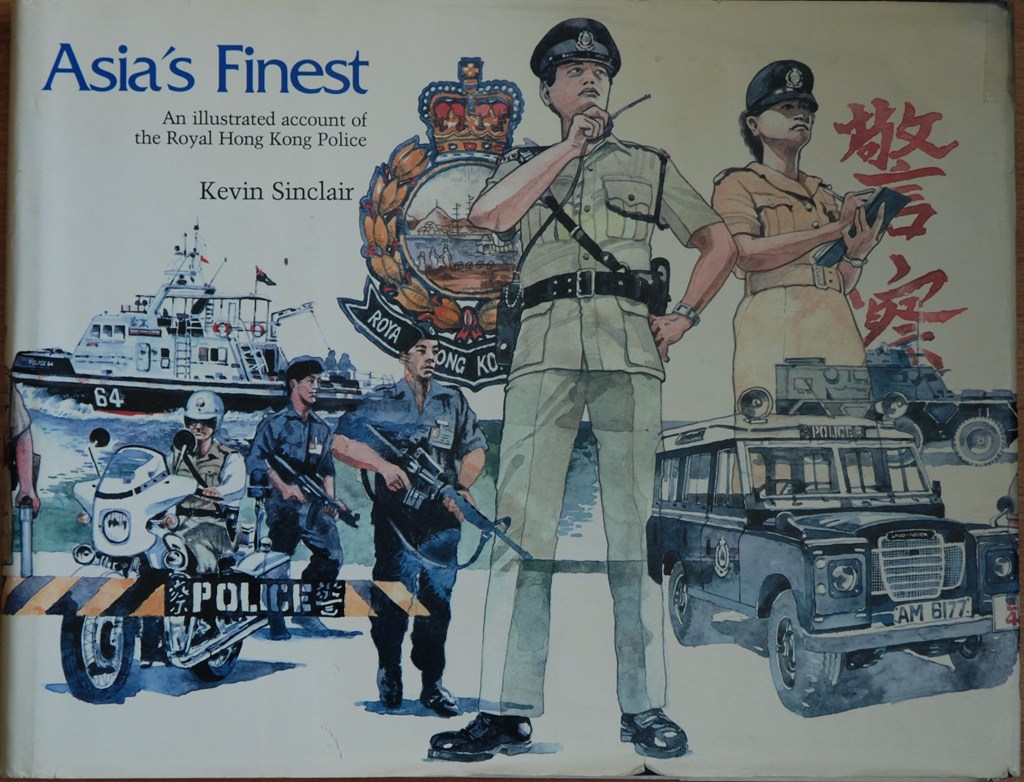
A one pip bomban
Immediately after passing out of the training school I was sent to Kowloon City police station which was not my first, or even any of my preferred postings.
I had been given accommodation at Homantin Single Inspectors’ quarters at a cost of 7.5% of my salary. This compact apartment consisted of a small living room with a kitchenette, a bedroom and a bathroom. Although modestly furnished with the standard Hong Kong government wooden chairs, PVC sofa and “hard as a plank of wood” mattress, I really liked the place, not least because I had my own space and was now free from the previous ten months of continual discipline and supervision at the police training school.
From the 9th floor of the high rise building my flat gave me superb views across Kowloon towards Sunset Peak on Lantau Island, and being late Autumn the sunsets were truly spectacular. The Homantin quarters were a convenient place to stay as we had a communal restaurant and a busy bar, and it was a good place to meet my fellow expatriate officers who were posted to police stations all around the Colony.
Like every newly posted “one pip bomban” I had to do an initial stint as “Duty Officer” in Kowloon City Police Station Report Room, a job so dull and dreary it seriously questioned why I was doing what I was doing.
The hours seemed long and dragged by slowly, and as the only expatriate officer in the entire police station, apart from the boss, Mr. Paul Deal, I felt isolated and rather lonely. I found my work day to be tedious and painfully boring, with little more to do than sit at the station front desk filing in forms and entering bail balances into a huge ledger like an office clerk from colonial India. Even the Officers’ Mess was deserted most of the time and I rarely saw anyone inside except for the only other expatriate officer who happened to be the boss of the station.
However, after a week or so I managed to escape the purgatory of the report room and was posted as 2i/c of a Patrol Sub-Unit underneath a local one pip Inspector who I found to be a particularly unfriendly individual.
I think local Inspectors found police training school to be rather stressful with all the British traditions, military like rituals and requirement to speak and use English. When they eventually escaped they found the police stations around Hong Kong far more more Cantonese and familiar.
I think employment terms and conditions that favoured expatriates in the British colony often inflamed a sense of inequality among the Chinese and this could manifest in resentment, even hostility towards expatriate officers like me. In some locals at least, not all. Whilst the term “racism” is banded about nowadays to mean any disagreement or perceived offence between people of different races, I would not say it was racism, just a minor culture clash or difference in personalities.
This local Patrol Sub-Unit Commander certainly had no intention of doing any patrolling himself and preferred to hide in our office writing memos, talking on the telephone and arranging his pens, and so I avoided him as much as I could by going out on patrol to explore the patch of Hong Kong I was duty bound to serve and protect. I did my best to attend whatever came up on the radio so I could learn how things were done, get to know all the officers in my unit and inflict my awful Cantonese of the local populace.
Over the following weeks I patrolled on foot most of my beat, including the infamous “Walled City” where I would often climb up onto the roof and watch the airliners skim between the high rise buildings just above my head and land at Kai Tak airport. The Walled City was a three dimensional maze, much like a scene from the dystopian science fiction movie, Blade Runner, with fizzing and sparking neon lights, dripping pipes and strange distorted noises. This alien structure appeared to be the same, whether it was night or day.
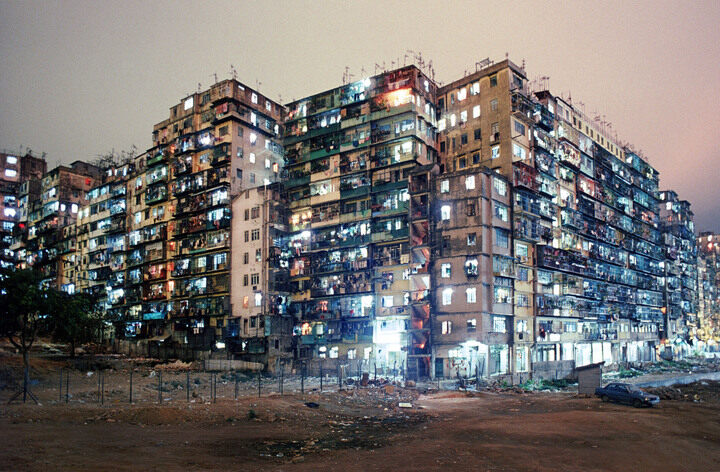
Huge rats with eyes that shined red in my torch beam ran up and down the maze of alleyways and there were hundreds of people milling about. I was immediately put off the ubiquitous local dish of fish balls for life after seeing them being made from huge piles of pungent fish paste fermenting in the humid heat on the dirty bare ground. Decades of rubbish and human detritus filled the voids between the densely packed tenement buildings. The smell was really bad and there was a cacophony of people shouting and arguing in Cantonese. Lining the outside of this Borg Cube were dozens of illegal dentists where the great unwashed got their fillings and dentures, with varying degrees of skill and hygiene. It was all very interesting to see, but it must have been nightmarish to live in.
At the centre was the ruins of a Qing Dynasty fort with some “yamen” cannons still remaining. All very interesting to see whilst on patrol. The history and chronology of the Walled City depended upon who you asked, but it was largely agreed the area was excluded from the original Treaty of Nanking and remained Chinese for some time into the 20th Century. Certainly, it was British territory and subject to the laws of Hong Kong by my time in the RHKP.
What I found strange was despite the filth and deprivation inside the Walled City multitudes of children who evidently lived somewhere within were going to and from school in immaculately white uniforms, tidy haircuts and with satchels full of school books. Well turned out school children seemed to be the norm in Hong Kong, regardless of wealth or poverty.
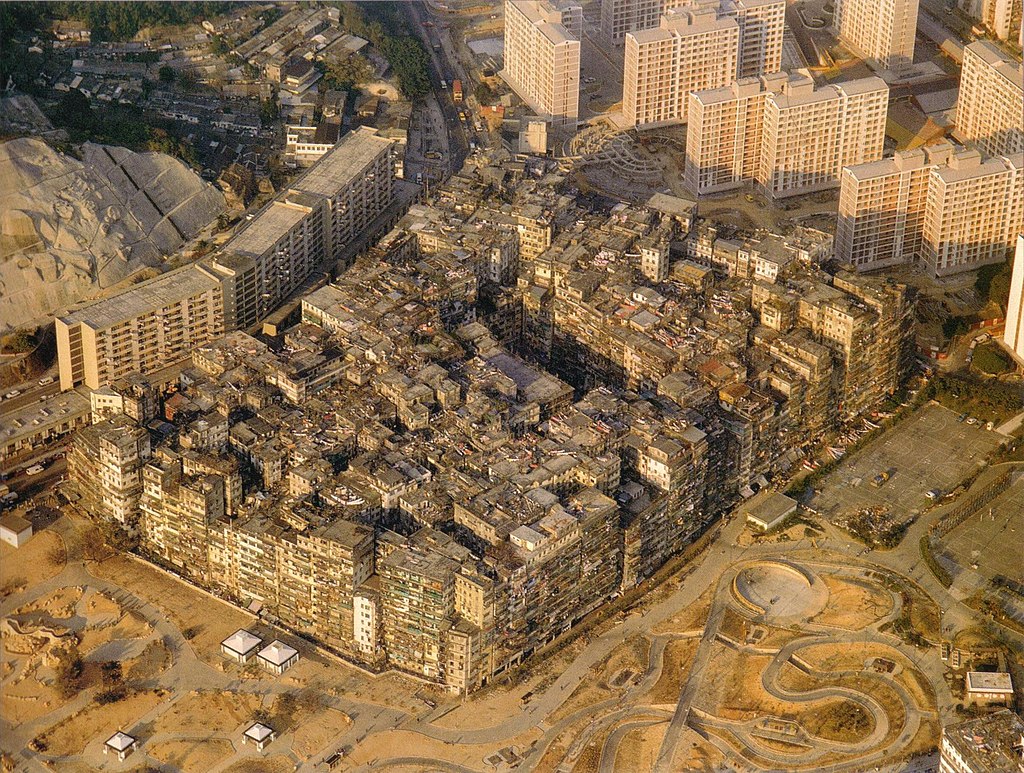
I got into the swing of things but it wasn’t long before I ran afoul of the top brass, most notably when I arrested a Radio Television Hong Kong film director (RTKK is a government owned media group) for cruelty to animals.
I had taken a report from an RSPCA Inspector who alleged that a film made by RTHK involved several scenes of real cruelty to animals and so I went to the local Magistrates Court along with the RSPCA Inspector as a witness and obtained a search warrant that I immediately executed at their studios in Kowloon Tong.
After several hours, and with a little guidance from a lady I assumed was the original informant, we eventually found film reels of incriminating evidence, not least scenes of an actor slowly boiling a turtle alive in a wok, burning a bird alive in a flaming bamboo cage and other scenes of inhumane slaughter of animals. No effort was made whatsoever to use any special effects.
I then located and arrested the film director under the Prevention of Cruelty to Animals Ordinance and as I hauled her into a police car was filmed doing so by what seemed every TV station and newspaper in Hong Kong, my mugshot appearing on the front page of most newspapers the next day.
Light the blue touch paper and stand well back!!
A territory wide debate ensued, largely Westerners accusing the Chinese of cruelty and breaking the law versus the local population complaining my actions were an attack on Chinese traditions and customs, as the theme of the movie was about a man battling cancer and showed him preparing Chinese traditional medicine as a cure.
Suffice to say, that same day I got hauled in to see the District Commander of Kowloon City (a Chinese Chief Superintendent whose name I have forgotten, if indeed I ever bothered to remember it) who was intent on giving me a good “bollocking”.
I was having none of it.
I produced a copy of Cap. 169, Laws of Hong Kong that I had already studied very carefully before applying for the search warrant and also referred the Chief Superintendent to the relevant chapter and verse in Police General Orders relating to “laying an information” before a Magistrate by an Inspector (pointing to my one pip on my shoulder for good measure), reminding the most senior officer in the district that the search was legal and with the authority of the courts.
I am quite sure Chief Superintendent “Ho Ever” had never met a “Probationary Inspector” such as Mad Max before and his attempts to admonish me along the theme of “you are new, you don’t understand Hong Kong, you don’t understand Chinese people”, was countered with, “the Rule of Law applies to everyone….equally”.
I don’t know if it was this “meeting without coffee” with the District Commander, or the fact that the film director eventually got convicted and sentenced at court (a decision quite unpopular in the local press), but my preferred posting of Tsim Sha Tsui Police Station was suddenly approved and I was transferred almost immediately.
I was sorry to say goodbye to my DVC, Paul Deal as he was a good boss and a very nice guy, but I was delighted to be going. Apart from seeing the inside the Walled City, Kowloon City division was not my cup of “naai cha”.
Tsim Sha Tsui was a completely different place. For a start there were a lot of expatriate officers in the police station, in fact I think every position at Chief Inspector and above was held by an expatriate officer. Also, the work was interesting, it was busy, and the Mess life was lively and a lot of fun.
The District Commander of Yaumati was called Jim Main, an excellent boss with a fantastic reputation, and my Divisional Commander was called Dick Tudor, a highly respected former Special Duties Unit (counter terrorist team) commander. There was a charismatic and slightly insane Senior Superintendent called Ian from Scotland who was in charge of the vice squads and affectionately known as the “chicken killing gingsi” (chicken being a derogatory term in Cantonese for a prostitute and gingsi meaning Superintendent). There was also a Detective Chief Inspector called Robin with a West Country accent who was in charge of the district crime and anti triad squads and who could speak fluent Cantonese and was quite a colourful character.
The “patch” of TST covered the southern most tip of the peninsular of Kowloon with the Star Ferry pier, luxury five star hotels, Nathan Road tourist area, Chung King mansions, lots of interesting retail and commercial building, all the bars and clubs (including Suzie Wong and Red Lips), and the infamous nightclubs run by the Sun Yee On triads.
The police officers attached to TST appeared more savvy and streetwise and I was much happier to work with them as a Patrol Sub Unit Commanders, the most junior command position in the force, but a front line and actually quite an important role, despite usually being lead by the most junior Inspectors.
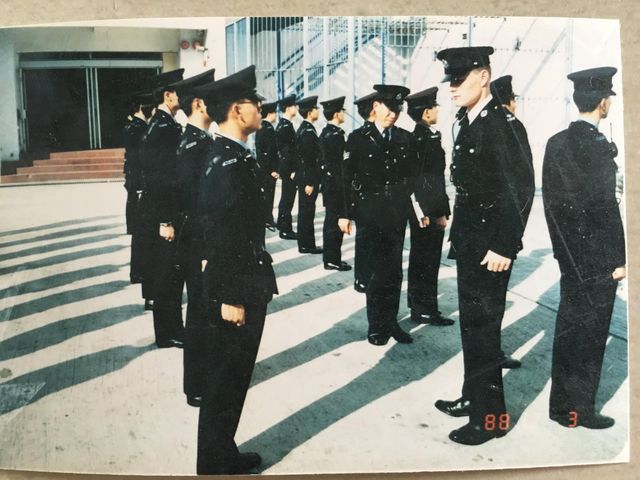
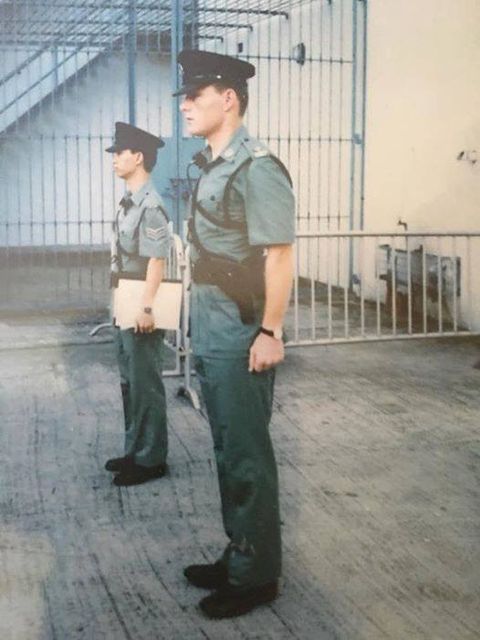
I moved out of the Homantin single Inspectors’ quarters in Kowloon and across the harbour into the infamous Hermitage quarters in Kennedy Road, Mid-Levels on Hong Kong Island side. This was mainly because it was just a short walk and ride on the Star Ferry to get to and from work, and also because a lot of my PTS squad mates were already living there and social life for a young early twenties officer like me with a dangerous smattering of Cantonese would be better.
The Hermitage was the scene of all sorts of shenanigans and legendary stories. Drunken and noisy arguments with taxi drivers at 3 a.m. would be drowned out by someone lifting their loud speakers to their open apartment window and blaring out “Land of Hope and Glory”, there were more Wanchai hookers and bar girls wandering in and out of the apartments than in Wanchai itself, and the peace was often interrupted by arguments, drinking parties, orgies and even troubled bombans shooting themselves with their service revolvers.
I lived next door to my friend Jerry, a former British Army Artillery officer who fought in the Falklands war, and who had passed out of training school a little earlier than I had. Including my rather disloyal girlfriend at the time, he had a constant stream of young ladies going in and out of his lair at various hours. On one occasion I found a very small Filipino lady in his refrigerator while I was helping myself to a beer. She must have been small because our fridges were tiny. Jerry denies this to this day and I now question whether I dreamed it whilst stuck by dried beer and tropical sweat to my vinyl government issued settee. There is a lot of haze to our recollections from those days, mostly due to alcohol and burning the candle at both ends.
To keep “the Herm” in some semblance of order, each floor was serviced and looked after by a Chinese Amah of indeterminate age who collected our dirty washing and cleaned our rooms. To keep track of whose clothes belonged to whom they would annoyingly write our room number in thick felt tip pen on every item of our clothing, even on the outside. They were hard working ladies who had seen it all and would nonchalantly clean our bedrooms and sweep under our beds regardless of whatever or whoever was on top.
Mad days, indeed
I enjoyed myself at “Jimsie” (TST Police Station). I commanded a patrol sub unit for a while, got involved in an assortment of operations and cases and worked with a great bunch of officers.
As a new pink face on the block, expatriate officers like me would often be required to engage in under cover operations, such as pretending to be tourists with the aim we would be solicited by prostitutes, touted to buy fake Rolex watches, buy drugs and pretend to be ripped off by the notorious Nathan Road camera shop scammers.
Our usual tactic was to wander around the tourist areas, get approached by a tout, and follow them back to a store room, office or shop, usually in the heart of some grotty commercial building. We would allow the “ruse” to continue until sufficient evidence was obtained and then we would call up our team who would raid the premises, seize the exhibits and arrest the culprits.
There were rules and guidelines about how far was far enough, and unsurprisingly there were quite a few volunteers, especially for the vice operations where many colleagues I know went far beyond what was considered “enough”.
I remember during one operation being picked up by a tout in Canton Road and being guided back to a room that was an Aladdin’s Cave of fake watches, handbags, belts, and other knock offs. I should have got an Oscar for my performance as a gormless tourist because when my raiding party arrived the scamsters still didn’t know I was a police officers and continued coaching me on what to say.
As my colleagues were bashing down the door to get in, I was ushered into a secret room full of their most valuable contraband. When I knew my officers were inside I called out, ‘ Can I come out, yet?’ and as I emerged the scamsters were still holding their fingers to their lips and whispering for me to be quiet, until of course my team called me “Dai Lo” (the RHKP equivalent of a Metropolitan Police Officer calling their boss, “Guv”) and the penny finally dropped, as did the expressions on their faces. Oh joy!
One particular case I worked on was very disturbing and involved an investigation into nightclubs running drugs and supplying underage kids to pedophiles. I had been cultivating informants here and there, including some English mamasans who, together with their Triad handlers, ran a nightclub in Tsim Sha Tsui called, “The Big Apple” and over time they disclosed useful information about their seedy customers, in particular intelligence about a pedophile ring involving so called reputable members of society who worked in the government, judiciary, financial and legal professions.
All very nasty, but successfully working on this case resulted in me being pulled out of uniform and attached to the District Crime Squad with a Geordie named Dave, who was a former UK police officer, and working with his top class team of detectives.
It was proposed that I transfer to Criminal Investigation Department (“CID”), or indeed remain full time in DCS, but I had my heart set on joining the counter terrorist team, the Special Duties Unit (“SDU”). This was encouraged by my divisional commander, Dick Tudor who used to command the unit and who thought I would make a good fit, if indeed I thoroughly prepared myself for the grueling SAS type selection.
I was already doing quite a lot of running, weight training, and interval training in my spare time, including lunch time runs with Dick around the jungle trails near the reservoirs, and had started to ramp up my swimming, both in the sea and also at the Police Officers’ Club in Causeway Bay that had a fantastic swimming pool surrounded by all the high rises and neon advertising signs.
I had heard that the selection was designed by the British SAS and involved testing fitness, endurance and determination, which I sort of expected, but also that candidates would be put through various phobia tests, involving confined spaces, heights, and water. That did make me slightly anxious as you never know how you will react until you do it.
I had to pass a pre-selection fitness test, which I did easily enough and so I was enrolled onto the SDU selection that was scheduled to start in November 1988 at the “old” Police Tactical Unit base in the New Territories. I knew a few of the other candidates and it was common knowledge that an Inspector had died on selection the previous year. Apparently the poor chap got seriously dehydrated during one of many long runs along the sweltering jungle trails and his muscles melted. A sobering thought, indeed.
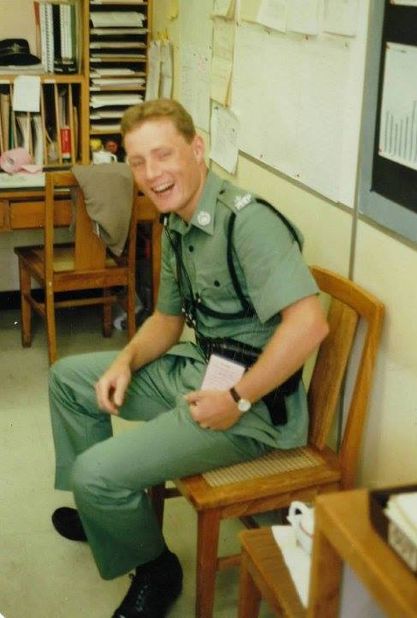
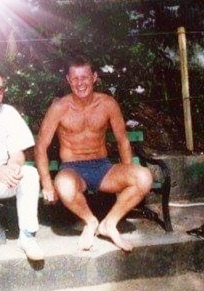
In the months leading to selection I followed a strict regime of fitness training and I think I was fairly well prepared when I eventually took the train up to PTU HQ in Fanling to start the selection process. I was a bit surprised when I arrived to see at least fifty Inspectors and Police Constables lined up on the parade ground for the initial briefing.
We were addressed by the SDU officers who were to perform the role of Directing Staff (“DS”) and they made it clear that selections was purely voluntary and we could leave at anytime without any drama. We were then issued with green overalls, and I was given a bib with “A1” written on it which I would be addressed by for the duration of selection.
We then started a series of non stop “beastings” that involved press ups, pull ups, sit ups, star jumps, climbing ropes, assault courses, burpees, running with people on your back, carrying heavy objects, interval running and sprinting, long runs, hill sprints, and the dreaded dumb bells that seemed to appear whenever we were at our lowest ebb and were intended to push you over your limits and throw in the towel if you didn’t cut the mustard.
The majority of the officers who lined up at the beginning gave up in the first 48 hours that to my recollection was horrendous and passed by in a blur of sweat, pain and exhaustion. Later, and often in the night we did long navigation runs in the mountains, through dark, prickly, and humid jungle undergrowth, and gut busting log runs up mountain trails. However fit you were, or thought you were, you were going to be taken beyond the point of exhaustion to test determination and character.
It reminded me of boxing training, but unrelenting and without rest, sleep or encouragement.
We did a lot of gym work, wrestling, boxing, milling and free fighting. The DS knew I had a boxing advantage and so during one session they set one person after another against me. I remember knocking out one other candidate and cutting open his face that resulted in several SDU junior officers piling in and hitting me at the same time until I dropped. I distinctly remember at some stage being held in a UFC style headlock on the ground during a wrestling test and biting my opponent’s ear to release myself, much to several of the onlooking SDU officers’ amusement, although inevitably I got punished with a session of dumbbells and press ups.
As candidates to become Assault Team Commanders, we were also given leadership tasks to complete that involved planning assaults and instant action options to raid terrorist hideouts and release hostages. Often we wrote down operational assault plans or gave verbal briefings to the DS using 3D models of buildings, ships and aircraft. We also practiced assaults at the close quarter battle range (CQBR) that often involved climbing ropes, abseiling or running up bamboo ladders with a Heckler & Koch MP5 assault rifles loaded with exercise rounds and training stun grenades.
All good fun and reinforced my desire to join the unit and keep going.
In one test we were taken to a huge container ship out in the ocean and had to plan raids inside the cavernous vessel and also repeatedly jump off the highest point of the ship, hit the concrete like surface of the sea whilst hanging onto one’s balls, and then climb back up caving ladders which I also thought was enormous fun, but really really exhausting. I enjoyed all this so much I was eventually told to stop doing it because I was grinning so much. Again, my misspent youth and love of adventure came to my rescue as jumping off high cliffs into the sea or diving into waterfall rock pools was not uncommon. I do think, retrospectively, that expressing emotion, be it enjoyment, was perhaps a bad idea as I think the grey emotionless type is perhaps the ideal candidate for this kind of job.
We slept in barracks and often got woken up at odd hours to run here and there, always to a point of exhaustion and then being asked to do it again, and again. All the time being reminded in a quiet and calm manner that all the pain can stop and we can go home if we wanted.
Several candidates did just that and left.
By the end of the first week there were just three Inspectors left and a hand full of police constables. Over the weekend we were allowed home, but this wasn’t really a day off as we were all given tasks to perform that in my case included breaking into a Star Ferry boat, gathering some mundane intelligence, drawing up floorplans of the ferry without being caught and then return all the way back up to Fanling. I suspect this was so the DS could have a day off rather than give us a rest or change in scenery.
The second week continued with much longer runs and more complex exercises. On one of the Tarzan assault courses that we were often presented with, I was traversing along a high rope and the rope broke behind me. I swung a short distance forward, crashed into the wooden frame, but managed to hang on. The other Inspector candidate, called Chris, who was behind me swung down into the ground, resulting in him breaking his back and being admitted into hospital. That left me and an officer called Mark as the surviving Inspectors.
We did more assault leadership tests and planning, more long distance endurance runs and some exercises that I remember very clearly such as creeping up under cover to “sniper positions” along streams and through thick prickly jungle. On this particular test I was crawling along a stream on my stomach, inching as stealthily as I could through the undergrowth and stopped in my tracks as a Banded Krate snake crawled from one side of the stream, over my arms to the other side. I can remember looking very closely at the orange, black and white stripes and shiny scales of the snake as it took its time and thinking I wish it would get a move on as the exercise clock was ticking down. This is completely mad and shows the mental state you can get yourself into, because ordinarily you wouldn’t get me going anywhere near a snake, never mind such a venomous one.
Then came a couple of days of phobia tests that involved jumping out of helicopters blindfolded; scuba diving (which I had never done before) but with blacked out masks and sitting in the murky slime at the bottom of the harbour, taking off the mask and mouth piece underwater and replacing it; being tied up with a diving balaclava covering our eyes and thrown in the sea; murder water polo in a swimming pool which again was like drowning and very exhausting; crawling underwater in confined and completely dark water tunnels; very long distance swimming; climbing and rappelling; falling backwards from the top of a fire service tower on an abseil rope without holding on; and other unpleasantries. Before the selection I generally thought the height tests would give me the most problems, but they didn’t and actually I thought all the abseiling and jumping from height was a lot of fun.
Unexpectedly, it was “the boxes” that got a negative reaction out of me and a brief, but involuntary refusal at the starting gate. As I look back the whole build up to the exercise was designed to create panic and anxiety and see how you would react. The boxes were in fact assembled inside a hanger at the fire services department training school and consisted of a series of three dimensional wooden passages filled with CS gas that you had to squeeze through wearing an old style blacked out gas mask that made a farting sound and had restricted air ingress to induce panic and claustrophobia. The tight passages in the boxes could be changed by the DS by adjusting slats forcing the candidates to wriggle through tunnels and down vertical chimney like passages, make tight difficult turns and get trapped in coffin like boxes. All the time with disorientating and very loud banging, screeches and shouting in the background.
As unpleasant as it was, and believe me it was really horrendous, it was not the actual task that really caused me problems during selection, it was my reaction to the questions about the test when interviewed several days later that would seal my fate.
I suppose, apart from being very fit and determined, the key to success is to eat as much as you can, keep hydrated, sleep when you can and most importantly not keep guessing, stressing and worrying about what is coming up next. As each nasty test unfolded I kept telling myself that they wont kill me, which wasn’t helped by the fact that selection killed a candidate the previous year.
On what turned out to be the final day we finished a very long run and when we got to where we thought the end was we were given an almighty bollocking about not putting in enough effort, being the worst candidates they ever had on selection and were told to run back. As we started to stagger off the DS called us back and said the selection was over.
It took a while for the DS to persuade us it REALLY was over.
I remember all the SDU officers congratulating me and the other remaining candidate, Mark. One of the SDU officers I admired the most told me he looked forward to working with me in “land team” which is what I wanted. The other SDU teams being “water” and “sniper”.
Not long afterwards I was invited into a debrief meeting, and when I entered the room the entire SDU team was sitting behind a long table in the semi dark. I assumed it was just a formality and I would be informed I was in the unit and would be starting in “Charlie” team (the six months training unit).
Instead, the OC of the unit, Colin, just said, ‘you suffer from claustrophobia’. Taken aback and a bit flummoxed I denied that I did but admitted I didn’t enjoy the boxes. I was then asked if something happened to me in the past that would make me claustrophobic?
What I should have said is “No” and waited for the next question.
I didn’t and foolishly thought I should explain myself. I recounted a bullying event when I was a kid and was trapped for hours under a tight tarpaulin by a notorious bully called Neil Grimley. It was horrific as I could hardly breathe, couldn’t moved and got spitefully kicked and punched as I pleaded to be let loose. I still have chipped front teeth to remind me when this bully and his thug pals pelted me with stones and rocks when I was swimming in a river one afternoon. He has a lot to answer for and its just as well for him and my continuing liberty that I never ran into him as an adult. Am I the only person who has fantasized about meting out retribution to a school bully in later life?
The reality is that during my youth I had no problems whatsoever with crawling about in tight spaces, being underwater and much of my unsupervised childhood involved daft activities such as climbing into cement mixers on building sites and starting them up to see how long we could last inside, crawling underneath the village church through the dark tight vaults and foundation vents, crawling through chimneys, and crawling through water tunnels near the reservoirs, etc. In fact, on the farm I worked on as a kid I often got attached to a rope by my ankles and dangled down a tight dark shit drain to retrieve the iron manhole cover that occasionally fell down the hole when scraping out. Nothing worse than that.
Anyway, little did a know that my answer sealed my fate. In an attempt to prove my worth I did the selection again the following year and did all the phobia tests, successfully, but I still didn’t get selected. So close and yet so far. To rub salt into a very sore wound Mark and Chris were selected, Chris having done little of the selection himself since he broke his back on the Tarzan course half way through.
Chris and Mark didn’t make it ultimately, as they managed to blow each other up on an exercise by selecting a real stun grenade instead of a training one, not fatally to their bodies, but fatally as far as remaining in the unit.
Some consolation, although not much, is that many years later I worked for the OC and with many of the SDU officers in the private sector and they often said I did very well on passing selection and that in retrospect they should have selected me, but defended their position at the time by saying they feared I suffered from claustrophobia and as such there would be a risk I would not crawl through an aircon duct or tight space if it was a viable assault option.
The irony of it all is that I am sure SDU in their entire history have never crawled through an aircon duct as an entry option. It really is a daft assault option in any situation. However, in 2010, when I was leading a fraud investigation company I actually did crawl through an aircon duct in a false ceiling at 2am in the morning in an office building in Shanghai to gain access to a locked room so that I could unlock the door from the inside so we could forensically image the company computer servers. Also, I have since completed my PADI advanced open water scuba diving qualification in the Sinai of Egypt, dived all over Asia and even used Nitrous gas mixtures for technical diving in deep volcanic vents and underwater caves.
If the face don’t fit the face don’t fit.
The worst bit about failing a selection, apart from not doing the job you set your heart on, is that when you go back to your unit you are seen as a failure and its a bitter pill to swallow. I found it very difficult to deal with, even today, because I know I would have done an excellent job.
I went back to Tsim Sha Tsui police station to find that Dick Tudor had been promoted and the divisional commander position had been taken over by a chubby office wallah type called Rob and my job as sub unit commander had been replaced by a local officer and I had to act as his 2i/c, the excuse given that they thought I passed SDU selection and wasn’t coming back.
I was later further “demoted” and sentenced to a junior admin role (ASSUC) that I fucking hated and to be honest totally unsuited to. I raised my displeasure about this “square peg in a round hole” posting with the “fat controller” who reprimanded me for being a “prima donna” and told me to get on with it and do as I am told. I also faced the prospect of a posting I had no interest in called SDS, that was ostensibly formed to enforce street level vice, drugs and gambling laws.
I had in those days, and still to this day, absolutely no interest in enforcing these laws that I think should be decriminalised. Whilst drugs, prostitution and gambling are of course real social problems, I don’t agree with the vast sums of money and resources spent enforcing them as crimes, the resulting mass incarcerations, nor the prohibition that creates the world’s most vicious crime syndicates and cartels. The war on drugs will never ever be won, and if I put my liberal criminologist hat on, there are far more harmful crimes that police and society should focus upon.
In the case of the Vice Squads, they were better known as the “Granny Squads” because the only people they ever arrested were grannies with “no previous convictions” for managing vice establishments and the triads behind the scenes got away scot-free as there was an endless supply of “old biddies” who were quite happy to take a minor first conviction rap for a decent pay out from the gangs behind the vice.
As for gambling? The laws were designed to protect the biggest gambling syndicate in the whole Colony, The Hong Kong Jockey Club.
All that said, these police squads can’t be as bad as the ones they have today. I dread to think if I was told by my sergeant, ‘Right, PC Utley, you have to dress up as a rainbow bumblebee today and genuflect to Marxists R Us’, or forced to command the “you really hurt my feelings” squad.
Thank God I was born in the 1960s.
Anyway, not to be outwitted, I started plotting my escape by getting myself listed as a platoon commander for the next Kowloon West Police Tactical Unit (“PTU”) company that was to form up in early summer 1989. That meant I had to find myself something to do for a few months rather than writing boring memoranda and staring out the window. The solution came from my PTS squad mate, Gus who had joined the Explosive Ordinance Disposal (“EOD”) Cadre and waxed lyrical about the joys of blowing things up and so I applied and was accepted for the upcoming course.
A few weeks later I was either sitting in a classroom, in the EOD laboratory or on the range learning about wheelbarrows, pig-sticks, bomb suits, needles, detonators, detcord, thyristors, PE4, amatol, bare wire loops, soak times, mercury tilt switches, collapsing circuits, x-ray inspectors, the art of hook and line, booby trapping white board rubbers and lavatory rolls and making things go “welly”. I also raised my skills in talking shit and drinking until my eyes bled to new levels in the EOD mess. I absolutely loved it.
The Senior Bomb Disposal Officer was called John R at the time, a former British Army Warrant Officer who performed many tours in Northern Ireland and survived many attempts by the IRA to kill him. After retirement from the British Army he joined the RHKP as a specialist Senior Superintendent to lead the EOD Unit. A great bloke who was supported at that time by the BDOs, Al, Jock, Jimmy and Bob, and indeed all the “Number Twos” of the Unit.
In essence, bomb disposal involves appreciating problems and solving them. There are many skills to learn and a lot of science to understand. The EOD cadre was formed to support the full time EOD Unit during periods of increased internal security and to focus on the criminal use of Improvised Explosives Devices (“IEDs”), rather than WWII bombs and other military ordnance that the full time officers focused upon.
During training we made every type of IED one could think of and then render the devices safe in realistic situations. In order not to blow ourselves up, but sufficiently scare us, the explosives and detonators in our letter bombs and other ingenious devises were replaced with “puffers” that are essentially very loud bangers. Black colour for outdoors and white colour for indoors. Nonetheless, both made your ears ring and your nerves jangle if you messed up.
I remember on one training week we each made about ten IEDs for a licensing exercise and one of my cadre team mates made an IED with a switch using a light sensitive diode with the idea that when the package is opened the electric circuit is complete and detonates the explosives. In the 1990s EOD HQ was located on the fifth floor of Police Headquarters in Arsenal Street, Wanchai and as we exited the building to load up the EOD vans, his pride and joy IED exploded in the compound, terrifying most of our more desk bound colleagues. An own goal because he neglected to factor in that ambient light in the EOD lab was not as strong as sunlight in the PHQ compound. It was also a reminder that many bomb makers blow themselves up when moving or arming their evil devices.
I passed the course and I stayed in the EOD cadre throughout my service in the RHKP until 1997. During that time we did an awful lot of training, I passed my licencing each year, was selected for the smaller and better trained Cadre, and was called up for several incidents. Without being too indiscreet, I count among my exploits: driving an EOD wheel barrow into the Excelsior Hotel and blowing up a box of moon cakes; blowing up a fish bomb stash of amatol on an island near China; blowing the tail off a crashed China Airways 747-400 that ran off the runway at Kai Tak airport; being involved in firing a rocket at a pleasure junk off Sek O quarry and setting it on fire; pig-sticking an IED used in a failed bank robbery; and killing a suicide dog, although I am pretty sure the dog was not called ISIS, nor had a settled intention of taking its own life.
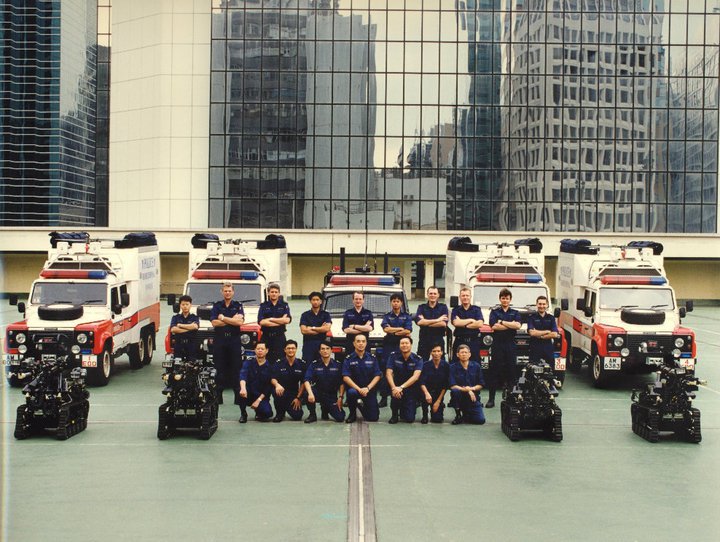
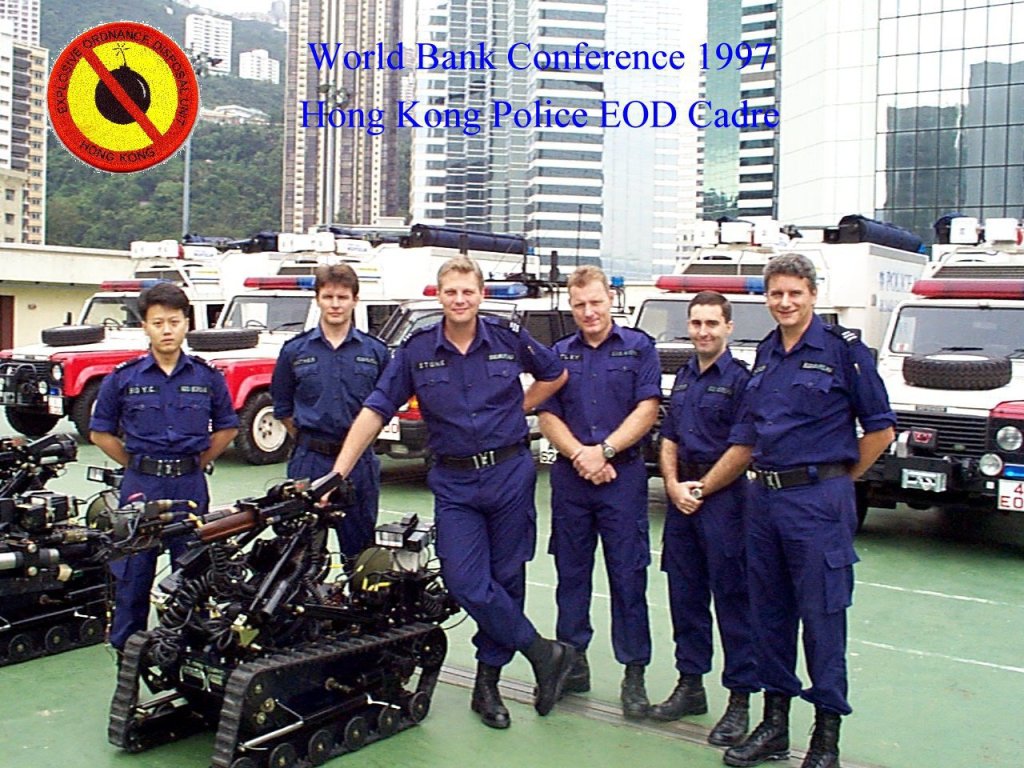
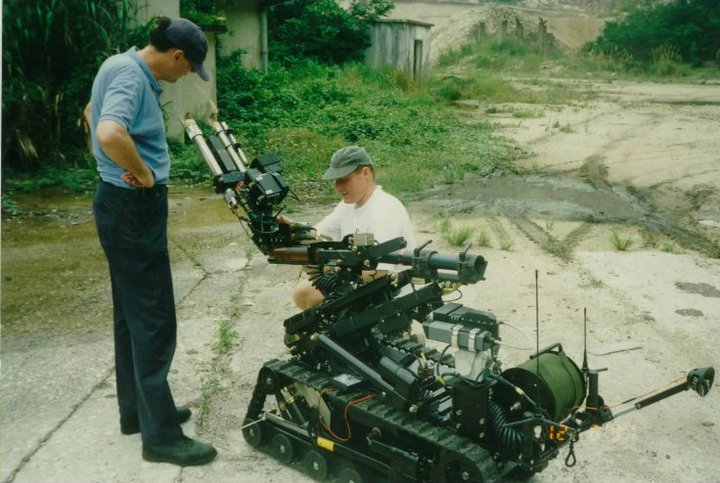
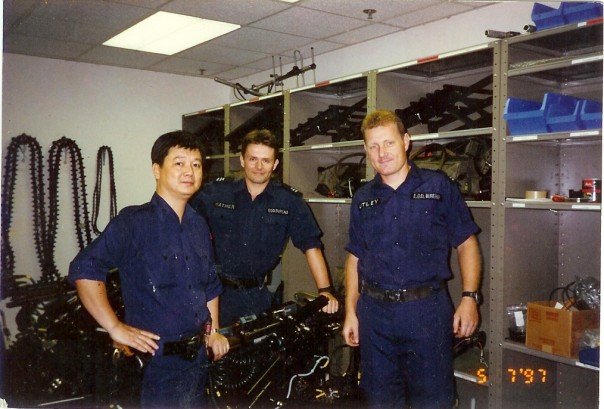
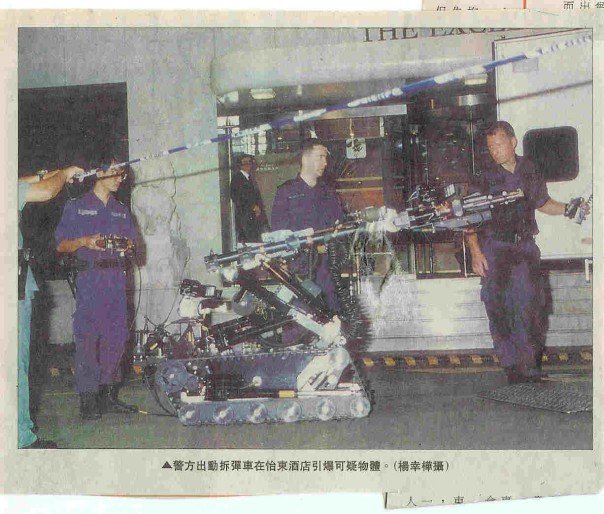
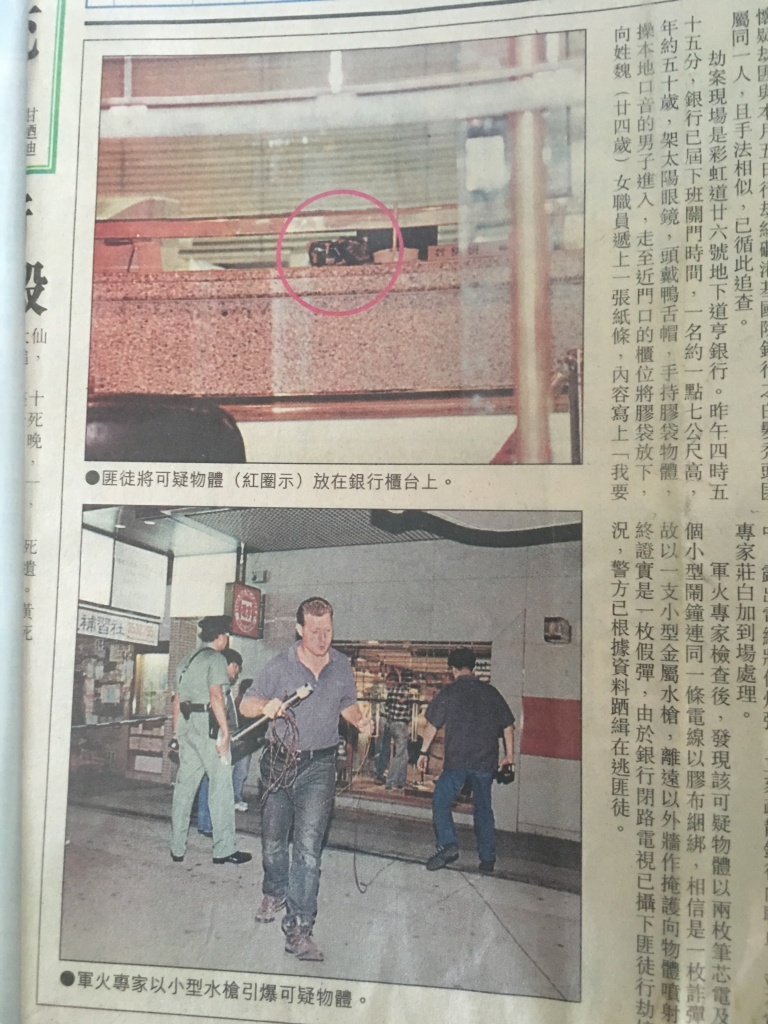
Having spent many happy weeks blowing stuff up and making things go bang I returned to Tsim Sha Tsui police station with all my fingers and body parts where they should be and was attached to Yau Ma Tei District Crime Squad for a few weeks assisting Dave, Dave and Robin on a couple of interesting investigations before I headed off up north to Fanling to start training as one of eight platoon commanders in PTU “Foxtrot” Company (6/89).
Police Tactical Unit is also known as the “Blue Berets” (or lan mo ji) and is a sort of paramilitary unit of the police force, primarily used for maintaining internal security in Hong Kong and in my day assisting the British Army with manning the border with China.
They are the guys that were shown on the front line battling the anti China rioters and CIA sponsored anarchists on the streets of Hong Kong in 2019, albeit with funky new kit and equipment, and I dare say slightly different tactics from our 1980s tactics which were to keep the baying mob 100 meters away, keep them moving, and use copious amounts of CS gas or indeed shotguns to persuade them to keep moving. Whilst we can train hard to be tactically competent to do our law enforcement job, we cannot control political cowardice and media lies and spin and I am afraid enormous harm was done to the morale and reputation of the Hong Kong police during those riots in 2019. Its awful to see the decline of Asia’s Finest.
Anyway, there are six regions in Hong Kong (Hong Kong Island, Marine, New Territories North and South, and Kowloon East and West). Most of my service was in Kowloon West and so that was the PTU company I was attached to and in those days Kowloon West was manned by either Foxtrot (“F”) or Golf (“G”) company.
Usually there were one or two PTU company under training and several PTU companies on attachment, based at respective regional headquarter police stations. Each company was made up of four platoons and each platoon consists of about forty officers comprising four section, four section sergeants, a platoon sergeant and two platoon commanders.
The Company HQ was lead by a Company Commander at Superintendent rank, assisted by the Company 2i/c at Chief Inspector rank and a Company Station Sergeant.
Each section of a platoon had a role and position within the platoon formation. Section one was armed with rattan shields; section two with CS smoke guns (1.5 inch Federals); section three with baton rounds (again fired from 1.5 inch Federals); and section four which was the firearms section and officers were armed with either a Remington shot gun or a Colt AR15 rifle.
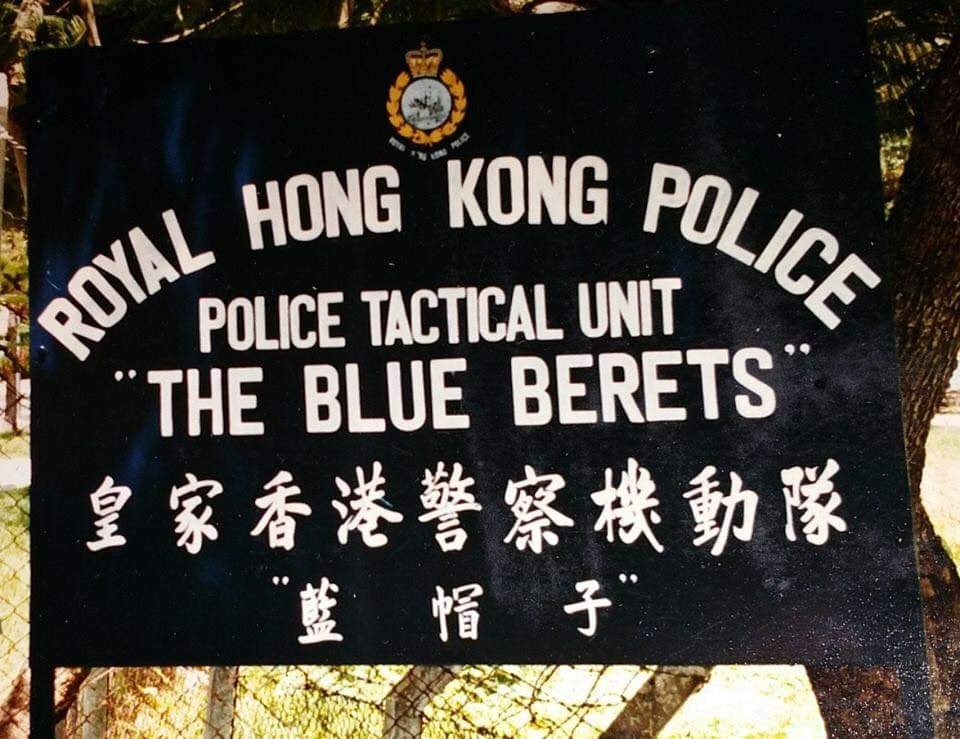
Initially Inspectors and NCOs arrived at PTU HQ and received training from PTU Staff who instructed us on all aspects of public order, riot training, sweeps, room entries, cordons and various internal security planning, techniques and operational orders. Later, Police Constable arrived and the platoon officers were responsible for their training and lesson planning, assisted by the PTU Staff.
At this time I was a keen runner and I would say there was far more physical fitness and running at PTU than at PTS. Most of the PCs were quite young, but some of the NCOs were getting on a bit and hadn’t done much physical training since they were themselves PCs in PTU.
Most of the Inspectors were one pips and an attachment to PTU was a prerequisite for promotion, with the exception of a few chain smoking, beer bellied CID officers who managed to escape any physical exertion.
When I started PTU I was dating Lilian, a Cathay Pacific stewardess who later went on to be my wife. Though I officially lived in single Inspector’s accommodation, as I mentioned above, I actually spent more time at her nice apartment in Junk Bay, near Sai Kung and so I commuted each day along the Tolo Highway up to Fanling on my Suzuki GS 750 motorcycle. This classic blue Suzuki was replaced with a triple cylinder Yamaha XS750 that I bought from Ben (my PTS squad mate). It was a bastard of a bike that never worked and I spent more time pushing it than riding it.
My usual routine was that I rode early to Fanling each day, did a run (either the PTU A, B, or C course), had breakfast in the Officers’ Mess, and then we started whatever we were doing that day which in the early stage of training was planning operational orders, fitness training, self defence, weapon training (where I finally mastered the marksmanship principles of our standard .38 Smith & Wesson revolver), company exercises, more running, and because I thought (stupidly at this time) I might have another go at SDU selection, even more running and weight training after hours.
I became a bit obsessed with fitness and health, and all my spare time was spent training, trail running, riding motorcycles and my new hobby, paragliding which was in its infancy and which I did with Gus who owned the first paraglider in Hong Kong.
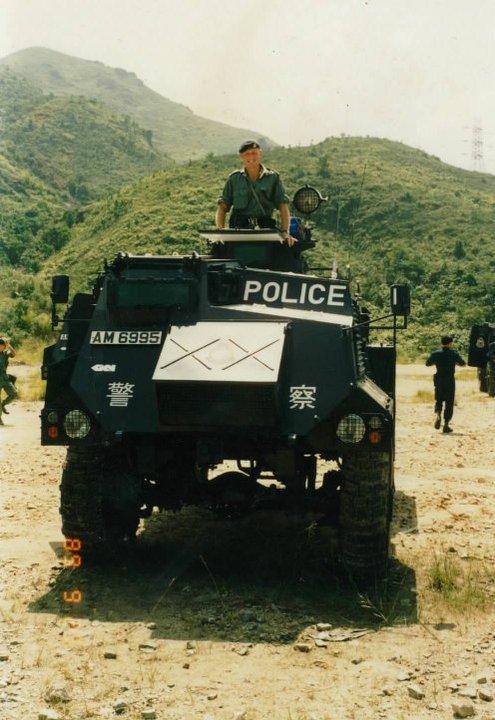
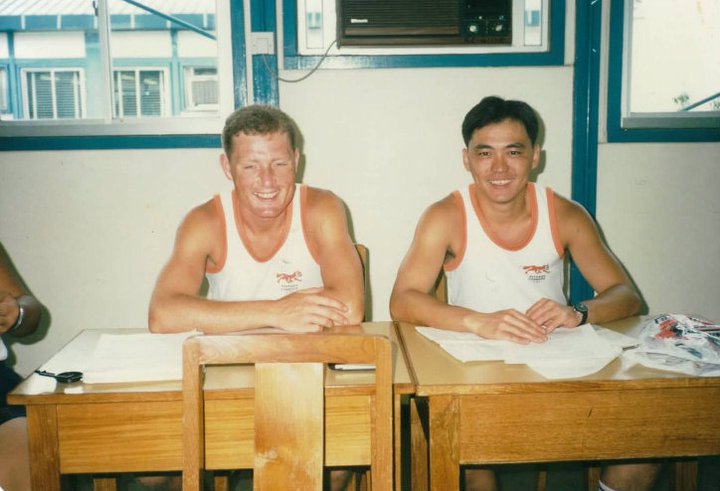
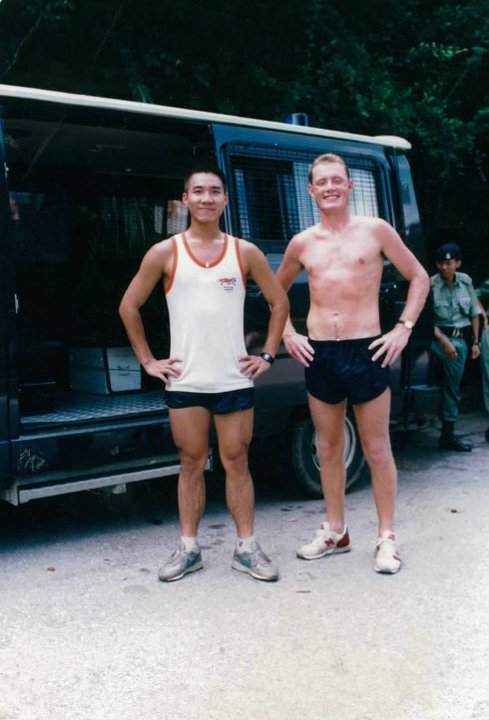
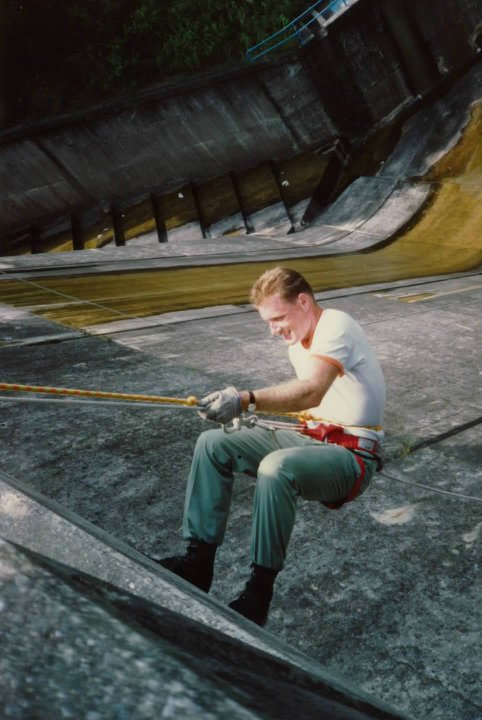
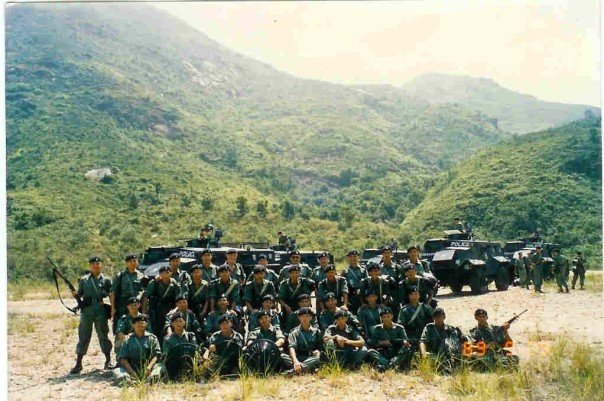
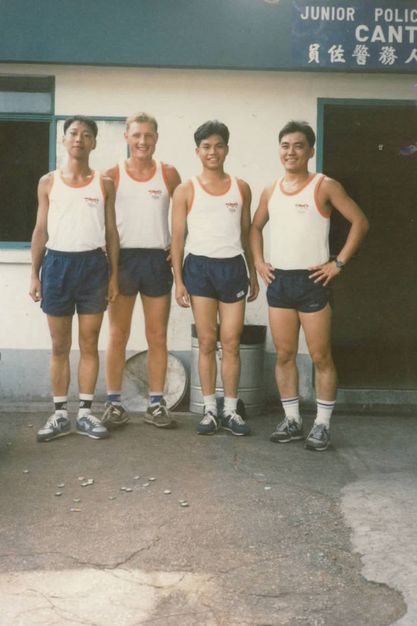
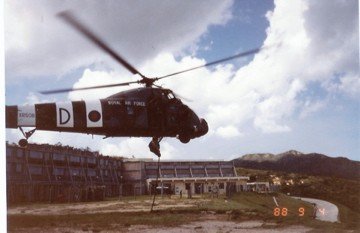
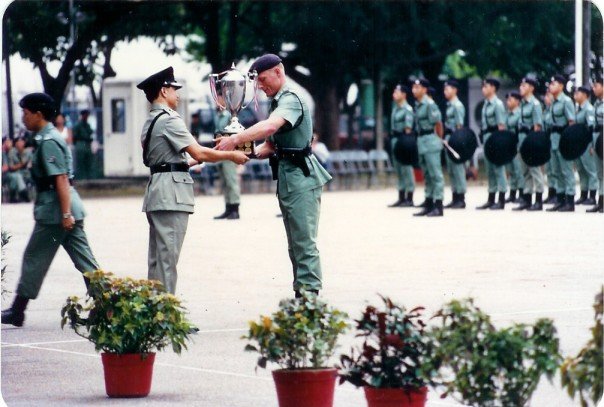
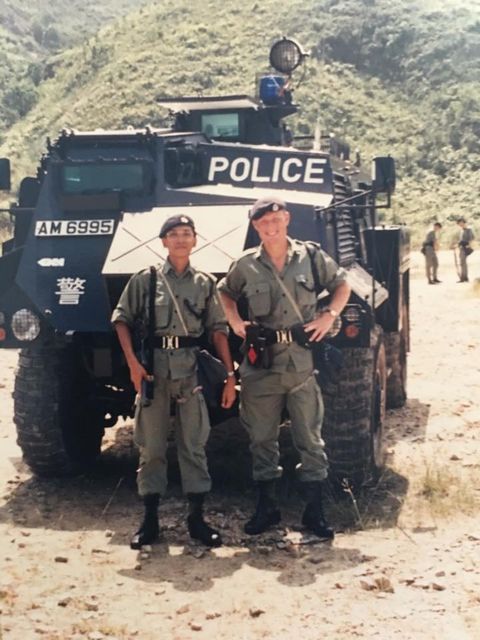
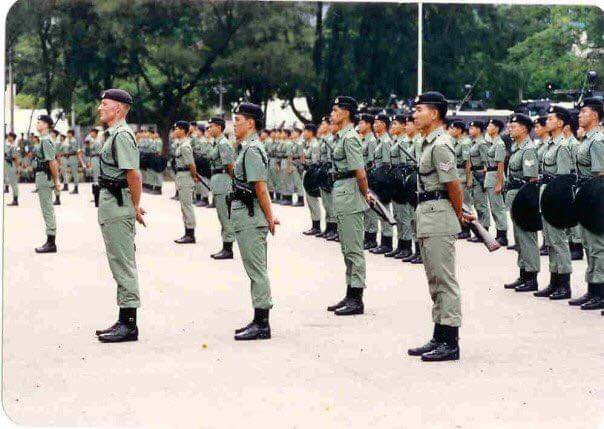

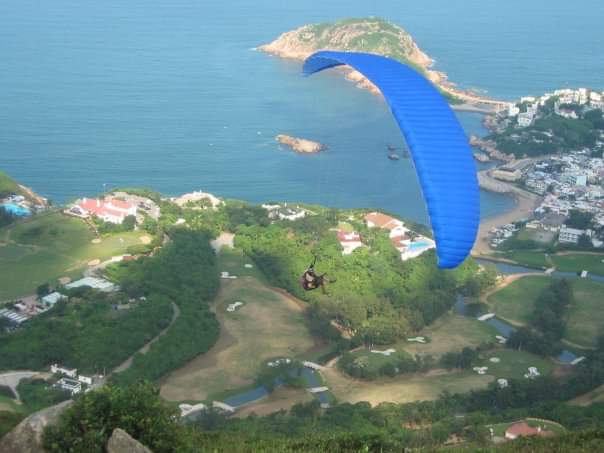
I loved PTU training and I am immensely proud of my platoon for winning best platoon. My mother and Lilian came along to the Passing Out Parade together with my guest, Paul Deal, my divisional commander from brief spell at Kowloon City.
My “oppo”, Oscar Lam got to ride around the PTU parade square in a Saxon APC and I got to collect the trophy on behalf of No. 4 platoon, Foxtrot Company.
Our company did not perform border duties ( subsequent companies did get posted to the Hong Kong/China border after passing out, taking over the role from the British Army) and so we went straight to our region, which in our case was Kowloon West. We were based at Mong Kok police station, right in the heart of Kowloon and perhaps one of the busiest and most crime ridden divisions in the Colony.
We would be tasked to perform support to divisions, extra manpower for events, and internal security roles. This meant we went to different places in Kowloon everyday, and occasionally further afield for large scale operations. I fondly remember our platoon meals that we took at various police stations as one of my sergeants was a master chef and used to “source” and cook delicious lobsters, crabs, garoupa, prawns, and other sea food delicacies that were prepared in various police canteen kitchen. I can honestly say the food was some of the best I have ever eaten and nothing cheered up my local colleagues more than stuffing their faces.
We occasionally responded to armed robberies and other serious crimes and I was often disappointed that Emergency Unit got all the exciting action. On one occasion we responded to an armed robbery and I was told by the EU commander, Bones Brittain, to form the outer cordon while his platoon swept the building, raided the apartment and arrested the villains. Bones was in the EOD Cadre with me at the time and later went on to be the SBDO of the Unit.
Years later, when we were in the EOD Mess together he would often reminisce how my platoon and I would eagerly turn up at a robbery or shooting scene in deepest darkest Kowloon, only to be sent off to do something mundane. Quite rightly, when the time came and I became a platoon commander in EU I would give some young and eager PTU bomban the same treatment with a “Right, I am in command here. You lot can go off and man the outer cordon”, just as Bones did to me.
We had a bit of excitement from time to time and an operation to arrest illegal immigrants had several PTU companies raid an entire construction site in Discovery Bay on Lantau Island at night. My platoon was given the task to green rope (slide down a thick rope that was green) from Wessex helicopters onto the top of high rises under construction and sweep the IIs down to other platoons who had cordoned off the buildings and secured the exits. It was quite risky running about on the top of a 30 story building under construction in the dark as there were many holes in the floors for lift shafts and rubbish shoots that you could fall through, many you could not see because the expanded polystyrene that was used to form the hole shape of shafts and ducts was covered in a thin layer of concrete.
In typical Hong Kong fashion the scaffolding was made of bamboo, fastened together with plastic cord and covered in green netting. The buildings we were searching wwere full of illegal immigrants from mainland China who were working and living in the construction sites and we found many were a lot more nimble than us skipping about on the bamboo scaffolding in their attempts to evade capture. One particular guy even leapt from the 25th floor of one building over to an adjacent building to escape us like some chase scene from a Bond movie.
I distinctly remember I told my platoon sergeant, Ah Bei, that if he wanted his freedom that much he deserved to have it and leave him be.
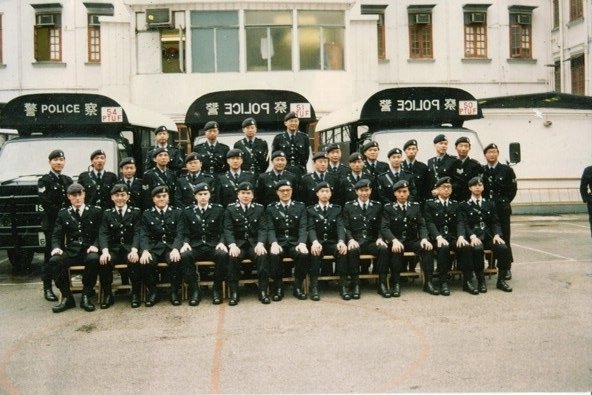
As my very enjoyable attachment to PTU was coming to an end so was my first tour in the Royal Hong Kong Police.
As I look back I think this was my happiest time in the police. My platoon were a super bunch of guys, I was super fit, work was fun, my Company Commander, Peter Bacon was a great boss and very good to me. I had breezed through the Inspector’s Standard II examination and so I got confirmed in the rank of Inspector and got a second pip on my shoulder. I had a very pretty girlfriend whom I planned to marry and I had enough money to be comfortable. I was young, healthy and doing what I wanted in life. Few young men experience that and I count myself lucky that I had such a great chapter in my life.
The disbandment of PTU “Foxtrot” Company was a sad moment for me , but I was looking forward to my “long leave”, the adventure ahead and seeing more of the world. I was too late in joining the RHKP to be employed on Hong Kong Government pension terms, and so as a “contract officer” I received a 25% gratuity payment of the total of my salary earned during the 3 years of my contract, a business class return flight to UK (that I changed, like all other officers, for an economy round the world air ticket), and 5 months paid leave in which I planned to travel though Asia, Australia, New Zealand, Hawaii, USA, Canada, Europe and then back to Hong Kong to start a second tour.
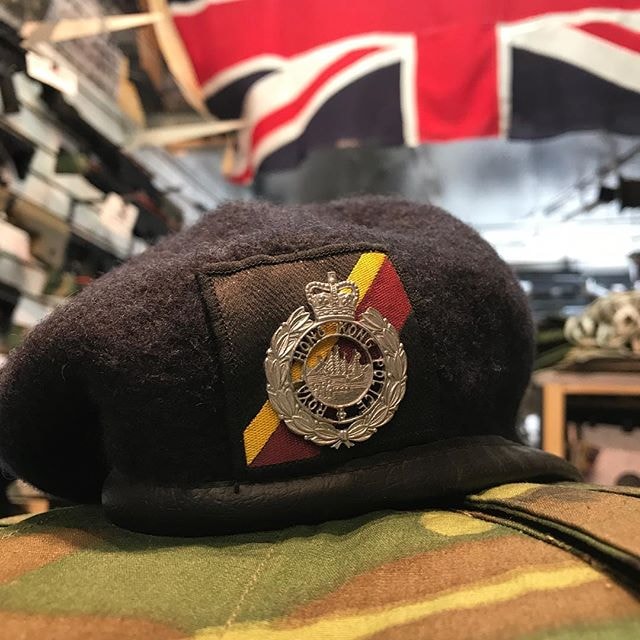
And that is what I did.
I spent some time with Lilian and her family at her home in Singapore, relaxed in Thailand and the Philippines, travelled across Australia with my PTS squad mate Stewart (who decided not to renew his contract in the RHKP, but to join HSBC Bank as an International Officer), did some hiking and exploring in New Zealand and Hawaii, met up with Lilian again in California as Cathay Pacific allowed flight attendants like her to swap flights and so we went to Vancouver, Mexico, Las Vegas, Chicago, New York and Washington DC on the east coast, and then eventually across the Atlantic back to England to see friends and family.
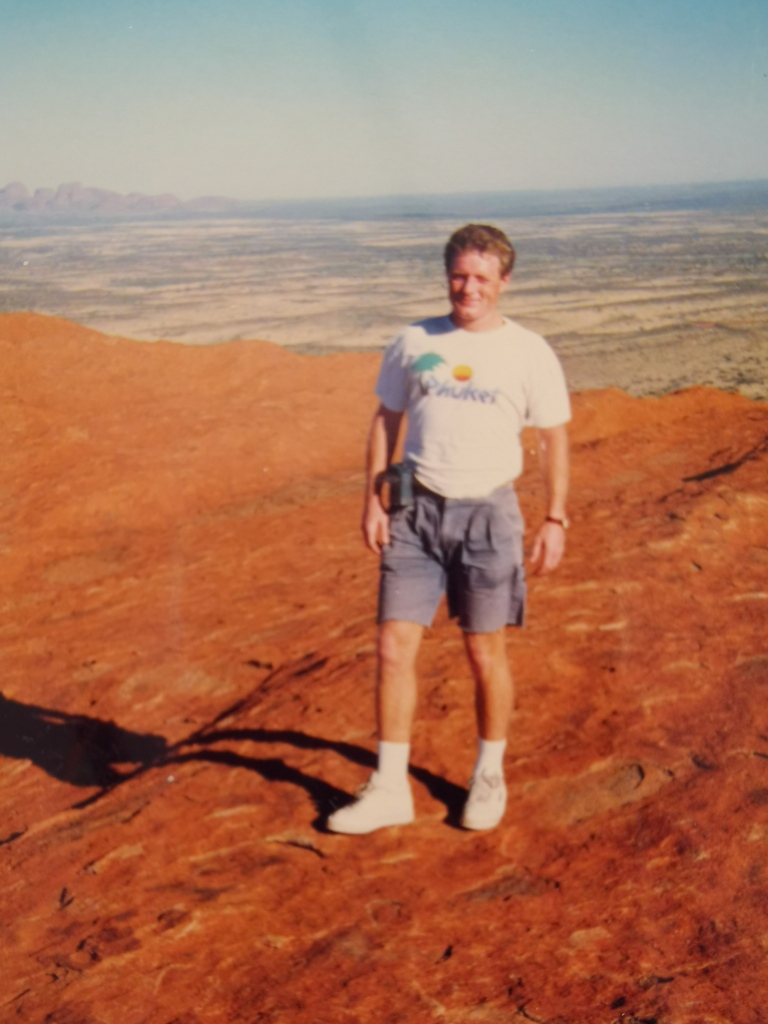
Being back in England seemed very strange and it was as if I never left.
I recall being in a village pub with some guys I knew from school and they asked what I was doing in London. I told them I had actually joined the Royal Hong Kong Police and was midway through a story about sliding down ropes from helicopters and triad gun battles on the streets of Kowloon when I noticed their eyes glazing over, and so I stopped and the conversation reverted back to heifers breaking fences on farms, whose shagging who, and who crashed their car recently.
In the future when I was asked what it was like in Hong Kong I would just say, “Oh, its fine”.
Next ……Chapter 3 – Gun battles, Yip Kai Foon and Emergency Unit Kowloon West
Knowing what I knew later from my travels I often wish I had joined the RHKP rather than Hertfordshire Constabulary!
You would have enjoyed it and fitted in well.